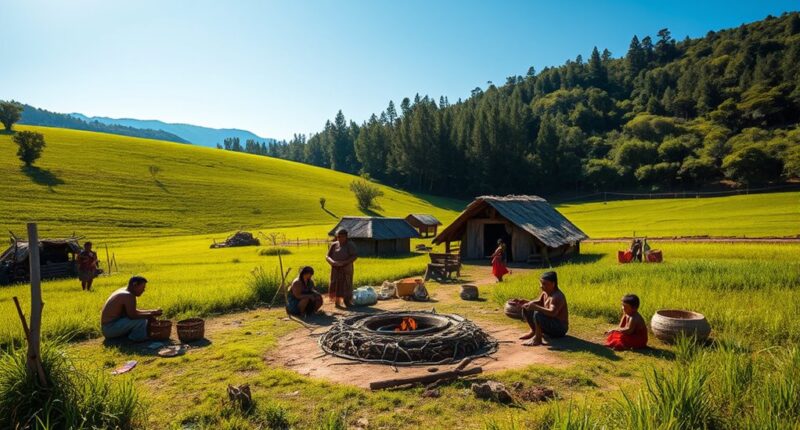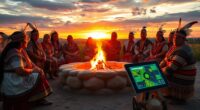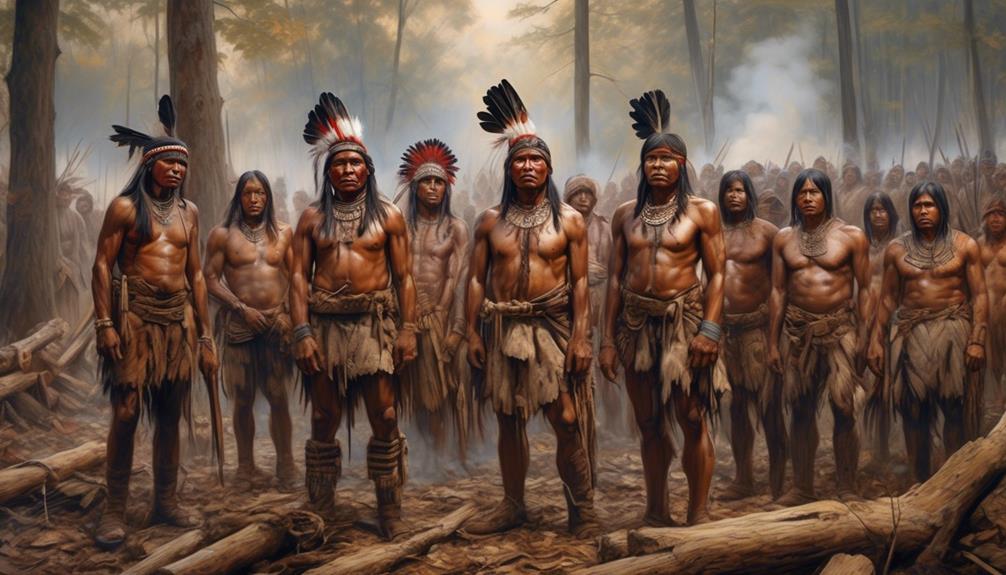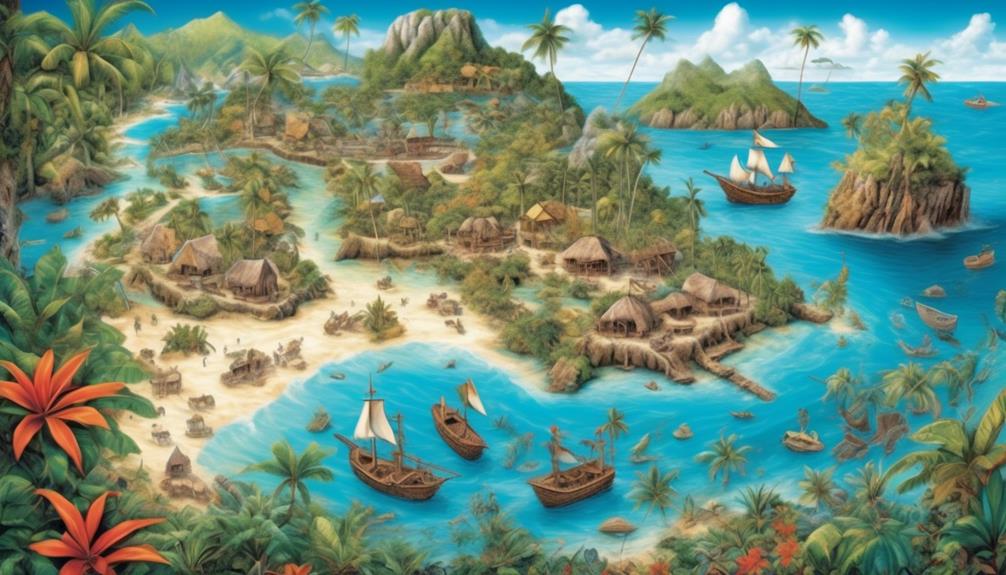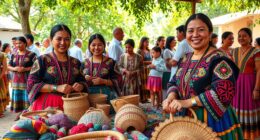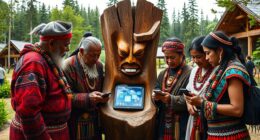Indigenous knowledge systems are practical, location-specific practices developed over generations that support sustainable environmental management. They reflect a deep understanding of local ecosystems, guiding resource use in ways that maintain ecological balance and resilience. These systems are adaptable, evolving with changes in environments to guarantee long-term sustainability. By valuing and integrating indigenous knowledge, you can help foster more culturally meaningful and effective solutions for preserving ecosystems. Keep exploring to discover how these traditions promote harmony with nature.
Key Takeaways
- Indigenous Knowledge Systems provide culturally rooted, practical practices that promote ecological balance and sustainable resource management.
- These systems are adaptable, allowing communities to respond effectively to environmental changes and enhance ecosystem resilience.
- They integrate local environmental understanding, supporting biodiversity and natural regeneration through traditional seasonal and harvesting practices.
- Indigenous knowledge emphasizes coexistence with nature, fostering sustainable, context-specific solutions for environmental challenges.
- Valuing these systems strengthens cultural preservation and encourages an inclusive, holistic approach to sustainability.
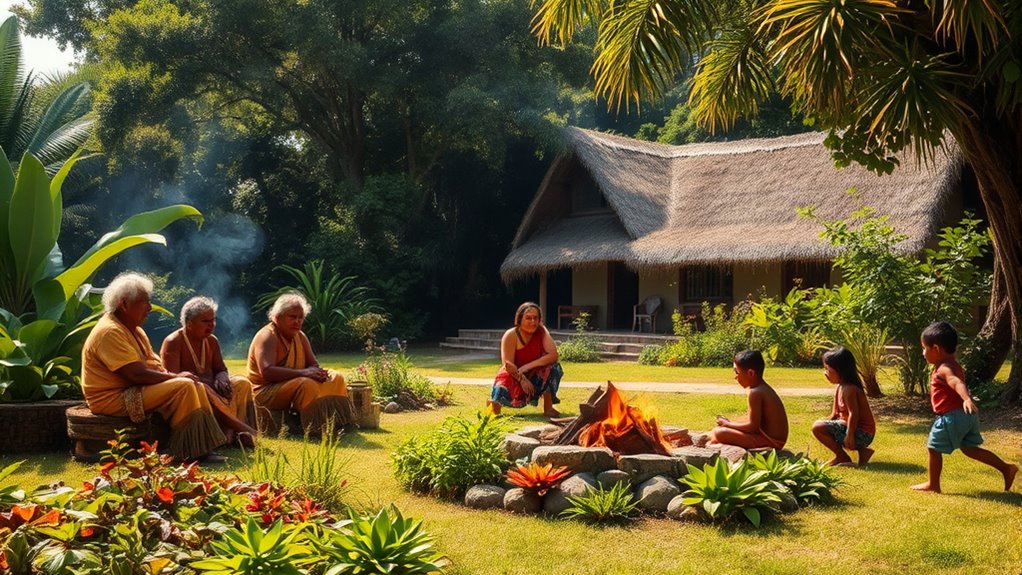
Indigenous knowledge systems have long served as essential frameworks for maintaining ecological balance and ensuring sustainable resource use. When you explore these systems, you realize they’re rooted in a deep understanding of local environments, passed down through generations. This knowledge isn’t just about data; it’s woven into cultural preservation, where traditions, stories, and practices reflect a harmonious relationship with nature. By valuing and maintaining these cultural elements, communities reinforce their identity and connection to the land, which in turn supports sustainable practices that have proven resilient over centuries.
Indigenous knowledge sustains ecological balance through traditions that foster resilience and cultural identity.
You might notice that indigenous ways of managing resources are often more adaptable than many modern methods. This adaptability stems from a keen awareness of ecological resilience—the ability of an ecosystem to recover from disturbances. Indigenous communities have learned to read subtle environmental cues, adjusting their activities to prevent overexploitation or degradation. For example, traditional farming techniques or hunting practices often include seasonal cycles that allow ecosystems to regenerate naturally. Such practices are inherently sustainable because they respect the limits of local environments, ensuring resources remain available for future generations. Additionally, these practices often incorporate high biodiversity, which enhances the ability of ecosystems to withstand environmental changes.
When you consider cultural preservation, it becomes clear that indigenous knowledge isn’t static; it evolves as communities respond to changing conditions. This dynamic nature strengthens ecological resilience by keeping practices relevant and effective. Indigenous communities often have intricate systems for managing water, land, and biodiversity, which are based on centuries of observation and experience. These systems promote coexistence rather than dominance, emphasizing balance rather than extraction. By safeguarding their cultural heritage, indigenous peoples maintain not only their traditions but also the ecological stability that sustains their way of life.
Recognizing the importance of indigenous knowledge systems for sustainability means understanding that they’re more than historical artifacts. They offer practical, context-specific solutions that modern science can learn from. When you support efforts to preserve and integrate these systems into broader environmental management, you help foster resilience at a landscape level. You’re also championing cultural preservation, which reinforces community cohesion and respect for traditional wisdom. In the face of global environmental challenges, embracing indigenous knowledge isn’t just respectful—it’s essential for creating resilient, sustainable futures rooted in harmony with the land.
Indigenous knowledge holds a crucial role in shaping sustainable practices that are both culturally meaningful and ecologically resilient. By learning from and valuing these systems, you contribute to a more balanced, inclusive approach to environmental stewardship that benefits everyone.
Frequently Asked Questions
How Do Indigenous Knowledge Systems Adapt to Climate Change?
You see, indigenous knowledge systems adapt to climate change by strengthening ecosystem resilience through traditional farming practices. These communities observe environmental shifts closely and adjust their methods accordingly, using age-old techniques that enhance soil health and conserve water. By integrating their deep understanding of local ecosystems, they maintain sustainable food sources and protect biodiversity, ensuring their ways of life can endure amidst changing climate conditions.
Can Indigenous Practices Be Integrated Into Modern Sustainability Policies?
You can incorporate indigenous practices into modern sustainability policies by respecting traditional sovereignty and valuing cultural preservation. By engaging indigenous communities as equal partners, you guarantee their knowledge informs environmental strategies. This approach fosters mutual understanding, safeguards cultural identities, and enhances sustainability efforts. Embracing indigenous practices helps create holistic policies that honor both environmental health and cultural integrity, leading to more effective and inclusive solutions for our shared future.
What Are the Challenges in Documenting Indigenous Knowledge Systems?
Like trying to catch whispers of the wind, documenting indigenous knowledge systems is challenging because much of it exists within oral traditions. You face obstacles in knowledge preservation, as these practices are often passed down verbally, making them vulnerable to loss. Language barriers, cultural sensitivities, and the risk of misinterpretation complicate efforts. You must approach with respect and patience to truly honor and safeguard these invaluable, living traditions.
How Do Indigenous Communities Benefit From Sharing Their Knowledge?
When indigenous communities share their knowledge, you help preserve their culture and traditions, ensuring cultural preservation for future generations. You also support the continued use of traditional medicine, which often offers sustainable and holistic health solutions. By valuing and sharing this knowledge, you empower these communities, foster mutual respect, and create opportunities for collaboration that benefit both their cultural heritage and sustainable practices.
Are There Risks of Cultural Appropriation When Using Indigenous Knowledge?
Imagine you’re using traditional medicinal plant knowledge from Indigenous communities without permission. That’s where risks of cultural appropriation come in. You might unintentionally disrespect their cultural sensitivity or undermine their rights. To avoid this, guarantee ethical sharing by collaborating directly and respecting their protocols. Recognizing their ownership helps protect their culture, prevents exploitation, and fosters genuine respect, benefiting both sides and promoting sustainable, respectful knowledge exchange.
Conclusion
Embracing Indigenous Knowledge Systems is like opening a treasure chest of wisdom that can guide us toward true sustainability. By respecting and integrating these ancient insights, you can help nurture the Earth’s delicate balance, ensuring future generations thrive. Think of it as planting seeds of harmony—what you nurture today blossoms into a healthier tomorrow. So, listen closely to these voices of the past; they hold the key to a more sustainable and resilient world.
Mary is a passionate writer who brings creativity and a fresh perspective to our team. Her words have the power to captivate and inspire, making her an essential contributor to our content. Mary’s commitment to storytelling and dedication to promoting Indigenous culture ensures that her work touches the hearts of our readers. We’re fortunate to have her as part of our team.
